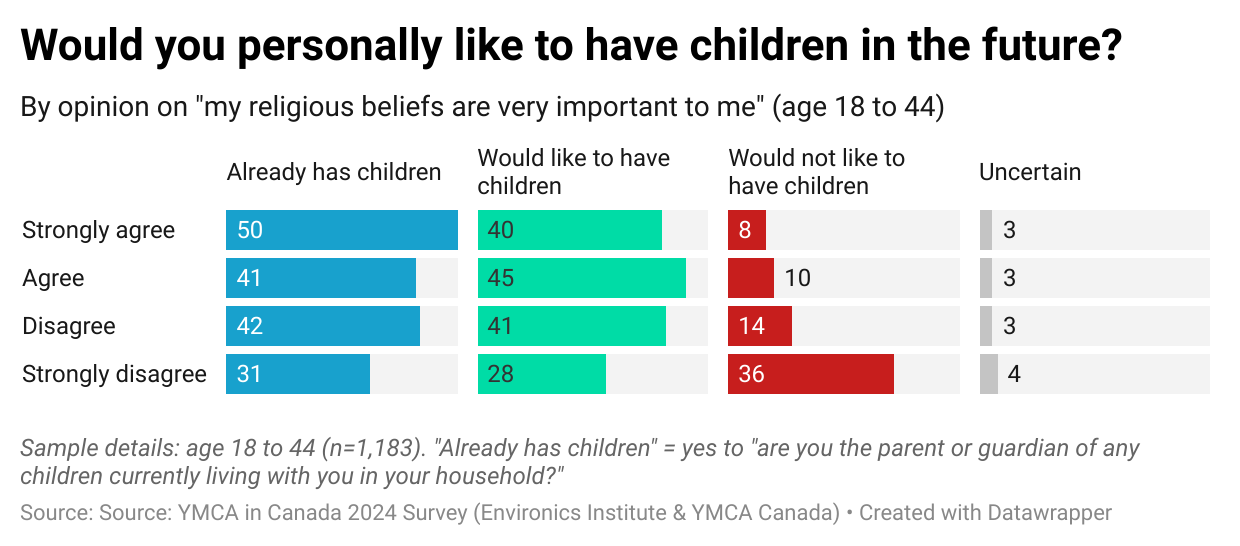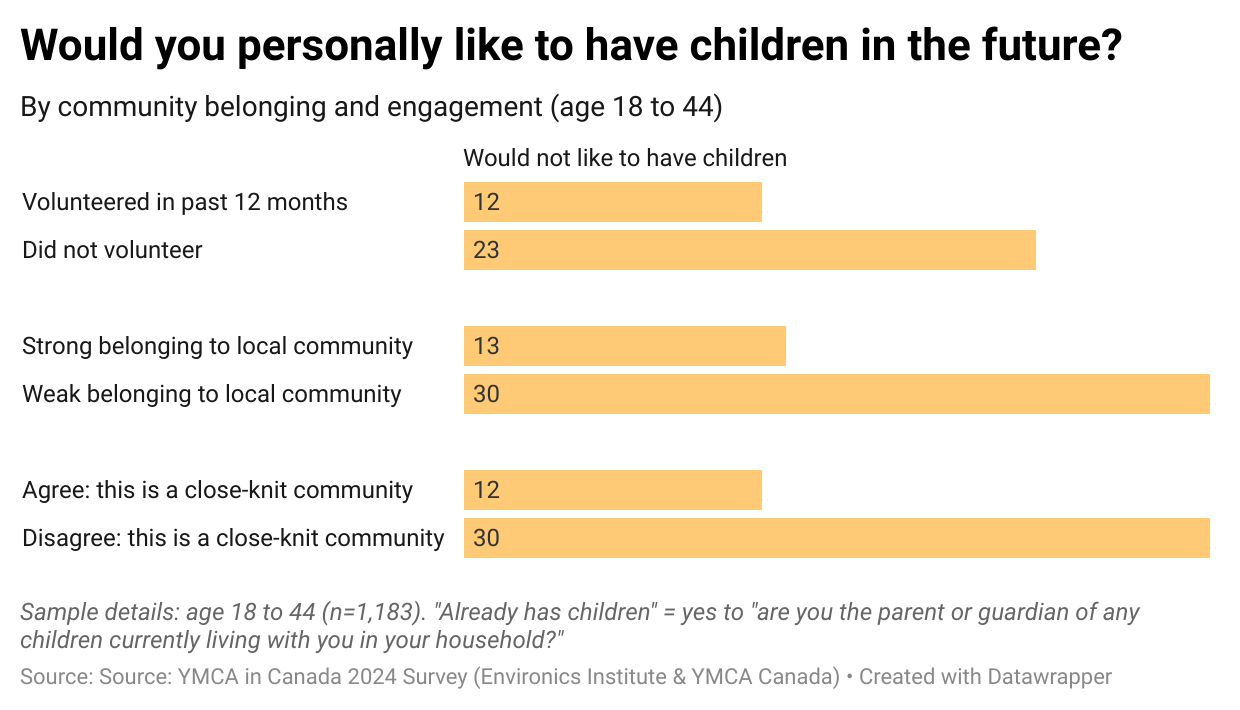Culture and community: a second look at who wants to have children
What if it’s not always about the economy?
Welcome to Part 2 of our discussion on the interest of young adults in Canada in having children – or not having them.
In Part 1, we presented two main findings. Among adults under the age of 45 who do not already have children, interest in having children is:
strongly related to relationship status: whether a person is part of a couple and, if so, whether they are married; and
not very strongly related to financial security: those who are worried about their household income or their ability to pay for housing are generally no less likely to say they would like to have children than their more financially secure counterparts.
If interest in having children is not that strongly related to financial security, what does it relate to? At this point, we can start looking at very different factors, including values, cultural background, sense of community and health.
In terms of values, the most notable relationship is with religion. About nine in ten of those (age 18 to 44) who agree that their religious beliefs are very important to them either have, or would like to have, children. Interestingly, this proportion is almost as high among those who disagree that their religious beliefs are important to them – as long as they don’t disagree strongly.
The outliers are those who strongly disagree that their religious beliefs are very important to them: 36 percent of those who feel this way about religion say they would not like to have children.1
In terms of cultural background, the intention to have children is higher among both immigrants and those who are racialized. Third-generation-plus Canadians (that is, those who are born in Canada to Canadian-born parents) in this age group are twice as likely to say they would not like to have children (24%) as are first-generation immigrants (11%). Second-generation immigrants look more like the third-generation-plus than the first generation.
Meanwhile, non-racialized Canadians (24%) are twice as likely to say they would not like to have children as are those who are racialized (11%).
Of course, these factors are connected. Immigrants are more likely than average to be racialized and vice versa. And Canadians who are immigrants or who are racialized are more likely than average to say that their religious beliefs are very important to them. But our analysis suggests that each of these factors is important on its own.
That said, the question about religious beliefs seems to be particularly important. In fact, of all the items we included in this study – both economic and non-economic – this measure of religiosity is the one that had the strongest relationship with interest in having children.
Engagement with and attachment to one’s community is also related to the intention to have children. Those who have not volunteered in the past 12 months, for instance, are more likely to say they would not like to have children (23%), compared to those who have volunteered (12%). People with a weak sense of belonging to their local community are also more likely to say they would not like to have children (30%), compared to those who have a strong sense of belonging (13%). And there is a similar difference in the intention to not have children between those who disagree that they live in a close-knit community (30%) and those who agree (12%).
Finally, health is a consideration too. One in five (21%) Canadians between the ages of 18 and 44 describe their physical health as fair or poor. And this group is three times as likely to say they aren’t interested in having children as are those who say their health is excellent or very good.
So, where does all of this leave us? At this point, we need to issue the standard reminder: correlation is not causation. No one is suggesting that going to church, volunteering or going the gym leads directly to parenthood. All that we can say is that certain opinions or behaviours coincide. How do young adults who are more interested in having children differ from those who are less interested? Among other things, they are more religious (or less strongly against religion), are more engaged in their communities and feel healthier. They are also more likely to be immigrants to Canada and to be racialized.
This means that our research so far offers no definitive answers, but only clues. As we saw in Part 1, most younger adults in Canada either have children or say they would like to have children. But one in five say they would not like to have children. To understand why, it might be worth pausing before assuming that it must necessarily be related to the cost of living or of housing. Non-financial factors, including the sense of connection younger Canadians feel toward the communities they live in, and the opportunities they have for community engagement, seem worth exploring.
The data in this post are from the YMCA in Canada 2024 survey, conducted by the Environics Institute for Survey Research and YMCA Canada. The survey was conducted online with a representative sample of 2,200 adults Canadians between January 25 and February 2, 2024. The data are weighted by age, gender, region and education to ensure alignment with the actual composition of the Canadian population, based on the 2021 census. The authors would like to thank YMCA Canada for making this data available to them for this analysis. The authors remain solely responsible for the results and interpretation presented here.
What is the Environics Institute for Survey Research? Find out by clicking here.
Follow us on other platforms:
Bluesky: @parkinac.bsky.social
Twitter: @Environics_Inst or @parkinac
Instagram and Threads: environics.institute
Cover photo credit: Natalia Olivera
Note that this is a sizeable group: 29 percent of Canadians age 18 to 44 strongly disagree that their religious beliefs are very important to them, the most common response to this question among this age group.










Really Liked the article and information. What impressed me was "correlation is not causation", a good reminder. Also a potential avenue in creating better communities. Didn't someone say something about families and villages.